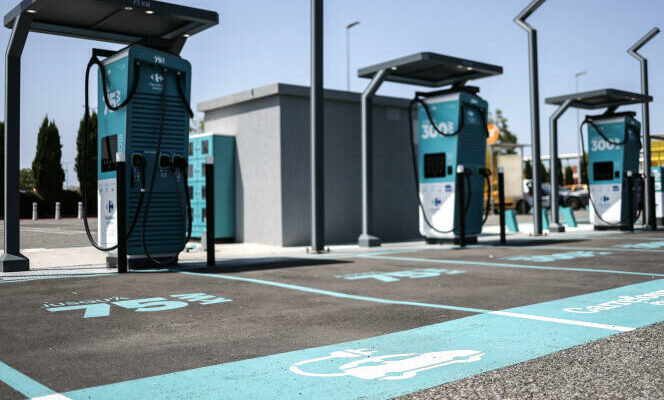No offense to the Cassandras, the network of charging stations appears sufficiently extensive to consider traveling in an electric car with peace of mind. At the end of October, there were 111,209 terminals in France, representing growth of 47% over the last twelve months. Over the same period, the growth of ultra-fast terminals (more than 150 kilowatts) has tripled. If the quantitative assessment is, for the moment, encouraging, the situation is different for the reliability of the installations (a quarter of the terminals are not permanently accessible), but also for the pricing system which, insists survey by the UFC-Que Choisir association published on November 27, multiplies the “slippages”.
This is a reality that electric car drivers experience on a daily basis: on the same terminal, the prices charged can vary considerably. UFC-Que Choisir noted differences of more than 800% between the lowest and highest prices charged by the different mobility operators who offer recharge cards. The latter can be oil companies (TotalEnergies, Shell), car manufacturers (Ionity), start-ups (Fastned, Powerdot), energy companies (Izivia) or data aggregators (Chargemap, Freshmile).
The association deplores “price aberrations” and “unjustified margins”. In Paris, at a Belib’ station (TotalEnergies), she observed, on a low-power terminal, a price per kilowatt hour (kWh) of between 0.39 and 2.12 euros, depending on the operator. On a high-power terminal installed on the A9 motorway, in Aude, the difference oscillates between 0.45 and 1.33 euros per kWh.
Even if 80% of charging operations take place at home, UFC-Que Choisir is concerned about the “great confusion” caused by the “erratic prices” practiced at public terminals. Pricing may be based on consumption in kilowatt hours and/or the duration of the connection. There may be added parking, start-up or reservation costs, the effect of subscription plans or even a “peak hours” supplement. The equation is all the less clear as operators do not always clearly display the price they charge and the operator’s remuneration is rarely highlighted.
Bank payment issues
“Recharging is a bit like hotels: the price of the room varies depending on the intermediary who sold the service”summarizes Matthieu Dischamps, general manager of Powerdot. “It’s a young market, which needs to structure itself, and we are aware of the anxiety-provoking dimension that this poses for those who choose to drive an electric car”recognizes the leader of the number one fast charging company in France with 3,000 terminals, mainly located in commercial areas.
You have 60% of this article left to read. The rest is reserved for subscribers.
